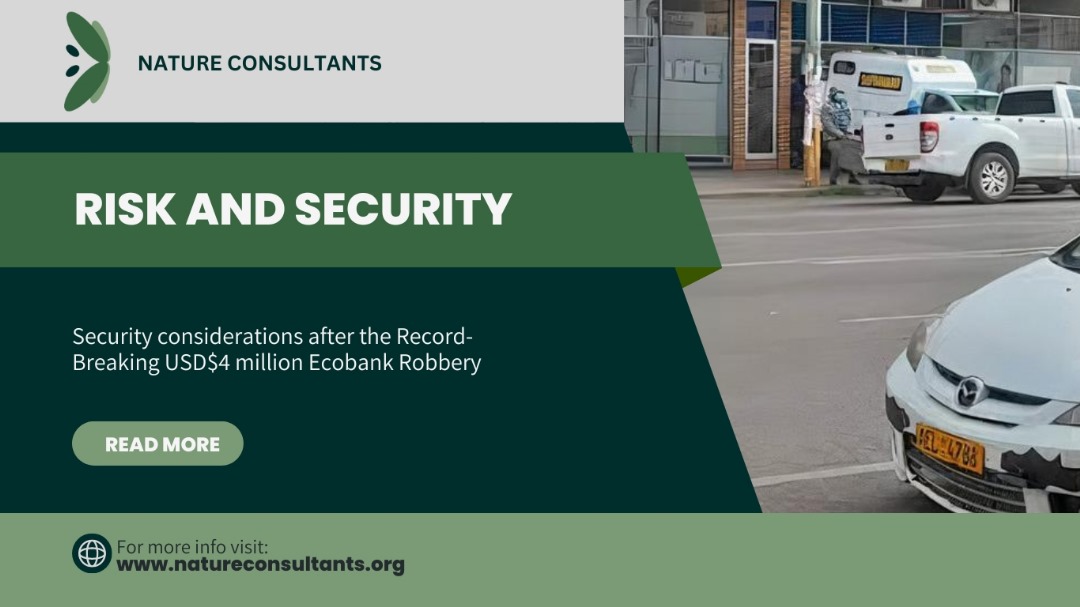Security
By Nina Aladi
Commercial crimes in Zimbabwe-break-ins

Introduction:
ROBBERS BLOW OFF SCHOOL SAFE…..ESCAPE WITH MORE THAN USD$250k”-Herald 21 March 2021:
ROBBERS VARNISH WITH USD$1.5M FROM ABC AUCTIONS” -Sunday Mail 9 October 2022
ARMED ROBBERS RAID LOMANGUNDI COLLEGE-NewsDay Zimbabwe 10 January 2024
These are the screaming headlines we wake up to on newspaper stands, popping up on our phone notifications, seeing on repeat on television news channels and booming on the radio on our morning commute to work.
When you think about it, it is jarring and terrifying!
Most commercial properties are ‘sitting ducks.’ And for businesses and sometimes homeowners, it’s not a matter of IF they will fall victim, but WHEN!!
None of us is completely oblivious to the fact that commercial break-ins are not just a growing challenge in Zimbabwe, but their effects are far-reaching. They render the affected companies non-productive, putting them in a position of not being able to produce to their full capacity for an indefinite period of time. These production capacity constraints have the downstream effect of compromised cashflow inflows, loss or reduction of revenue to the Government, loss of wages for staff, supply chain disruptions, delays and running battles with insurance companies to pay up – (i.e. assuming the affected company is actually insured and compliant with the terms and conditions set by the insurance company to qualify for compensation).
Points/tips to consider:
The comprehensive cost of commercial break-ins, emotionally, financially and mentally requires that we educate and equip ourselves best to mitigate against the risks and not fall victim to this growing crime statistic. Here listed are beneficial tips worth noting when drawing up and implementing a security plan for your business:
● Do not keep large amounts of cash in one place, especially on the premises. A deterrent for companies holding large amounts of cash on-premise is that insurance companies usually determine a maximum limit in their terms and conditions that they will be willing to pay out should a break-in occur.
● Have a robust system in place whereby if you have over a certain amount of cash, it automatically triggers the next action of moving the excess cash to a secure location offsite. These could be done electronically or manually. For instance, cashiers are instructed not to have more than 3 x “100” dollar notes at the front desk, bottom/out of view/ to a more secure safe that cannot be accessed or opened by the cashier, and which gets regularly collected – more collected during peak hours etc.
● Try not to leave cash (except petty cash) on-site overnight.
● Have prominent, clearly displayed signs on premises that state for example “The cashier does not have access to the safe” and/or "no large amounts is kept on-site” etc.
● A significant number of commercial break-ins take place with the help of insiders. A culture of proactive and purposeful open communication for instance “No cash on-site” has been known and the consensus organization-wide, to help discourage any would-be business insiders develop ideas and facilitate these robberies.
● Some large shops have used a system of enhancing/promoting good relationships amongst staff members to mitigate and deter any idea of an insider sharing information and colluding with outsiders. This has been known to produce good results in the sense that, any person (insiders) suspecting any of conniving with an outsider is encouraged and has mechanisms to come forward and report such suspicions. In so doing, such plans are potentially disrupted before they reach the “hatching stage”. Besides, openness and transparency within the work culture also promote higher productivity.
●If a significant proportion of transactions are in hard currency, have CCTV installed in the most vulnerable places. Although CCTV devices and solutions have their flaws, they serve as a good deterrent on so many occasions. If you do decide to have a CCTV solution, consider having its storage facility off-site. Also consider having the most appropriate CCTV camera settings (the correct pixel setting for the purpose it is needed for – identifying details if needed), protection of cameras to prevent vandalism hence of no use when needed etc. Ensure the CCTV system works best for you. CCTV systems and its tailored use will be discussed in another topic (Watch this space)!
● Electronic sensors have also been known to deter any would-be perpetrators of commercial break-ins. Especially if positioned correctly, strategically following route paths and storage locations, they have been known to give good early warning signs of intruders, that trigger the deployment of a reaction team, police etc. However, you must understand that these have flaws also in the sense that intruders have been known to destroy these, try to bypass them, staff members forgetting to switch the alarm on before they leave (inside jobs or genuinely forgetting to do so), intruders try to take what they came for before the arrival of the law enforcement agents etc. (this weakness can be delved into in another topic for discussion).
● Consider staggering cash leaving /arrival times. Having a routine has been known to lead to exposure. It is also worth mentioning that you should limit the number of persons who know any given timetables for cash movements within the organization. The more people know (especially staff members), the easier it is to plan a theft.
● Ensure a robust locking system(s) if you do decide to keep cash onsite (or any valuables) on site. Consult any reputable company that deals with good locks, and safes and invest in such. It is also best practice to have several layers of locks mounted on very strong doors. This not only serves as a deterrent to would-be thieves, but it also acts as a form of delay to them on their way to your most valuable asset(s).
● Key management – You can have the best keys and locking devices; however, if these are easily accessible by anyone or not managed well, you might as well not have any. Key control/management or in other words, access management is vital to the prevention of cash loss/theft. Strongly consider using non-duplicable keys, if it is within your budget. Use biometric or electronic systems in places where you have huge assets such as large amounts of cash and data. (Again, this can be delved into deeply on a separate topic) However, the focus here is to manage your keys (access) well. People should not have access to them unless they have been issued to them. Authorised persons issued with keys should have the times logged when they were issued and returned etc. Also, Consider the dual person issue- this means two persons should sign for keys to valuables. If a key is suspected missing or unaccounted for within a reasonable time, consideration should be given to changing the lock that this key opens. It could have been duplicated and scanned, in preparation to use.
● Encourage the use of other forms of payment other than cash. – credit/master cards, coupons, transfers etc. ie reduce cash handling to the least that is practically possible.
Conclusion:
Of course, these are by no means an exhaustive list of “does and don’ts”. Various business types, locations, environments, crime trends, methods of operations of general, clientele etc would affect the type of risk mitigation/prevention methods you would consider putting in place. However, one must bear in mind commercial burglaries do not only affect the cash being stolen but they might also have casualties.
More and more violent cases are being reported and it is common knowledge that the more vulnerable a site is, the more attractive it is as a target. This means that it is probably only a matter of time before an exposed site (site with little or no preventive measures in place) becomes a victim of this growing crime trend.
It is worth engaging the services of a security professional security personal carry out an independent security analysis of your cash flow and general security procedure. Also engaging the local law enforcement agents to offer security advice. We intend to give free assessments to three (3) businesses.
Click here and type in “Free Assessment” in the comments section and one of our agents will get in touch with you.


